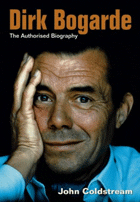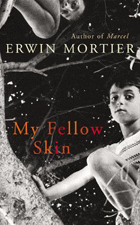 Our friend from England,
Tony Heyes, reviews two completely
different types of books in this issue...
Our friend from England,
Tony Heyes, reviews two completely
different types of books in this issue...the authorised biography of Dirk Bogarde
by John Coldstream
&
My Fellow Skin by Erwin Mortier
| Tony
is one of our most prolific reviewers, managing at least two reviews
per issue, in between traveling and otherwise staying busy with his
partner, friends, and family. Write to Tony to let him know what you
think of his reviews or suggest books he might enjoy (or perhaps
review). Contact |
 Dirk Bogarde Dirk Bogarde by John Coldstream Published by Weidenfeld and Nicolson 2004 IBN 0 297 60730 8 Most people manage their identity to some degree, constructing a persona to present to the world that only approximates to what they perceive as their real self. Among politicians, film stars and those in the public eye, “spinning” has reached the level of a low art form. The vast majority of the population is guilty of only minor transgressions in comparison with the crimes committed by P.R. professionals. The discrepancy between perception and reality is perhaps greatest amongst those who feel they have something to hide, for whatever reason. Historically, gay people felt that they had much to lose by revealing their true selves and sought to “pass” as straight, saving their “real” selves for their most intimate circle. This form of self-censorship was known as being in the closet and until recently most gay people found it necessary to be there, to varying degrees, if they were to function in society “without let or hindrance” as it says in one’s passport. Nowadays most gay people have opened their closet door, if only an inch or two. Dirk Bogarde, however, was so far in the closet that he was almost in Narnia. At a time when many show business personalities are openly gay, his denial of his sexuality now seems paranoid. He made a point of volunteering that he was not homosexual even when the subject hadn’t been brought up. Not being satisfied with the traditional English attitude of “it goes without saying”, he had to spell out something that was patently untrue. His need to remain firmly closeted was clearly profoundly rooted in his psyche. It is easy, in these more liberated times, to sneer at this apparent “cowardice” but to do so is to ignore both the realities of the time in which Bogarde reached the peak of his fame and the nature of the persona that the film industry had constructed for him. Bogarde was, in Britain at any rate, a matinee idol (He made a Hollywood turkey, a biopic of Liszt, with Capucine who was presented as his "romantic interest" for a while). Someone not a million miles from where I am typing this thought him extremely “chocolate boxy”. He was always rather too spinsterish for my taste; his emotions, especially his rages, seeming synthetic and worked up. To the majority of the British public, however, he was extremely desirable. Teenage girls, in particular, swooned over him as they had previously swooned over Frank Sinatra and were later to swoon over the Beatles. Anything that destroyed his public image would have been box office suicide. John Coldstream’s authorised biography seeks to present Bogarde as he was, warts and all. Born into a comfortable middle class family, Bogarde had every advantage. He was brought up almost as a girl by his beloved nanny. The rot seems to have set in when he was packed off to stay with relations in Glasgow for three years after the birth of his brother Gareth. This created in him a life-long resentment and feeling of rejection, a trait he shared with his doting mother. For Bogarde this period spent among far less privileged Glaswegians would be the psychological equivalent of Dickens’ stint in the Blacking Factory. In a sense, he never really recovered. It was whilst in Glasgow he became star-struck, spending many hours in the cinema. On leaving school Bogarde was sent to Chelsea Polytechnic to study Art but soon drifted into acting. Any thoughts of a career in acting were soon interrupted by World War II, during which he had a relatively brief relationship and then met Tony Forwood, for a time Glynis John’s husband, with whom he was to spend the rest of Forwood’s life. Forwood is throughout Bogarde’s writings referred to as “Forwood” and described as his “manager”, as though their relationship never went beyond the purely professional. After the war Bogarde’s career blossomed. He was taken up and groomed for stardom by the Rank Organisation. He became increasingly dissatisfied with the parts offered to him and turned to continental film-makers to make what he regarded as more artistically significant films, notably Death in Venice, The Night Porter and Providence, but not before he had made a significant contribution to British law-making in Victim. Victim was a brave plea for tolerance for homosexuals at a time when Parliament was considering decriminalising homosexual behaviour. It was the start of a long process of legislation that is still going on. The Civil Partnerships Bill is going through the House of Commons right now. Despite this courageous stance, Bogarde still denied his homosexuality. Even Noel Coward and John Gielgud were not as paranoid as he was and it is a pity that he seems never wholly to have come to terms with himself. In later life he took up writing both fiction and autobiography, the latter concealing as much as it revealed. A lifetime of heavy smoking took its toll and his last years were dogged by ill health. Mr. Coldstream’s biography is scrupulously fair and an excellent read. He mentions Bogarde’s many acts of kindness yet the overall impression one is left with is of a man who didn’t know when he was well off, who could be gratuitously rude and who was never at ease with himself or his life. None of his successes seemed able to reduce the chip on his shoulder. One is left with the feeling that he died feeling he had been in some way cheated. |
 My Fellow Skin My Fellow Skin Published by: The Harvill Press 2003 ISBN: 1 843 43046 0 Some novels emphasise plot, some character and some mood. Erwin Mortier’s My Fellow Skin is primarily a novel of mood. This is not to say it is without incident – some of the events in it are quite dramatic – but the story is related in the first person and concentrates on the feelings of the narrator and his relationship with the rest of humanity. Anton Callewijn, the narrator, lives in Flemish-speaking Belgium. He is the child of an impoverished family who were formerly farmers. Now his father works as a labourer. He recounts, from the vantage point of his fortieth year, the salient points of his first nineteen. Most gay readers will identify with his outlook. As far back as he can remember he has felt a stranger in a strange land. Like Quentin Crisp, the minute he stepped out of the womb he felt he ought never to have come. The world is an unfathomable place to him. Mr. Mortier conveys the bewilderment of childhood with the sort of precision and clarity one usually encounters only in dreams. Childhood is the time of life when experiences have an immediacy and vibrancy they will never have again and here they are conveyed in all their vividness and wonder. Anton is constantly puzzled by the adults around him. They never explain things to him and he is too introverted to intuit what is going on. Only slowly does he come to realise his family’s place in the scheme of things, his mother’s nervousness and his father’s feelings of social inferiority. The deaths of his older relatives are thought to be matters to be dealt with discreetly and quickly forgotten. He is puzzled by his sadistic older cousin Roland who comes to live with Anton’s family when Roland’s mother enters a mental hospital. Roland is clearly an adolescent in the grip of raging hormones. Anton is fascinated by his very different physique and startled to discover that his own body soon begins similarly to change. The day comes when he has to move to a secondary school at the age of thirteen. Expecting to see an ancient pile (“Ivy-covered professors in ivy-covered halls”?) he is disappointed to be greeted by what he describes as a building like a stack of white shoeboxes. Feeling totally at sea he is relieved to be greeted by a slightly older, far more sophisticated boy with long blond hair who introduces himself as Willem De Vries. Willem has travelled extensively. His father is a wealthy architect who has some clout at the school on account of the large donations he periodically makes. Rather improbably Anton still cannot tie his own shoe laces and asks his new friend to help him after a swimming session. Willem has already been at the school for a year but has been kept back and takes Anton under his wing. It is a desolate place. Both boys are bored to extinction and spend all their time together, opting out of games or social activities. Their friendship develops rapidly and exclusively. The headmaster of the school, a celibate priest and therefore obsessed with sex, summons the two boys to his study to warn them of the need to integrate with the rest of the school. Anton doesn’t even know what “integrate” means. So oblique is the warning about what religious orders call “particular friendships” that it sails completely by him. Willem, who knows exactly what he means, says nothing. Neither boy, one because of ignorance and one by resolve, is deterred and their friendship soon ripens into love, eventually becoming physical. Their involvement in each other for the rest of their time at school is total and is set to continue at University. Alas, the end of the story is the end of their idyll. The reader is jolted as Anton is left sadder but no wiser. Mr. Mortier’s technique is somewhat reminiscent of certain French films except that the story is told chronologically. There are, however, long gaps that the reader has to fill in by inference from what follows. Because the story is so firmly rooted in Anton’s consciousness it takes on a dream-like quality. We accept his love of Willem but are not sufficiently informed to understand it. Its existence is suddenly a fact. Neither the motivation nor the attraction of either boy is fully explained, leaving the reader with a vague feeling of having to read too much between the lines. Even so, this is a beautifully written and haunting book, one with which everyone who has at some time or other felt alienated and tried to make sense of life will identify totally. |